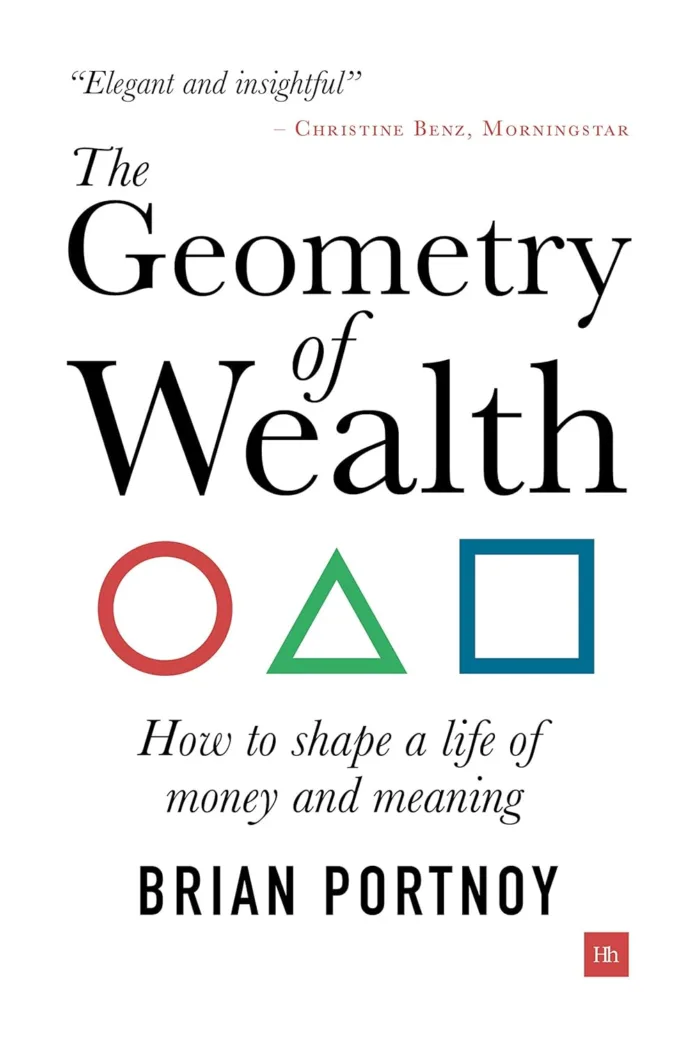Introduction
As a financial-planner-gurgaon/" target="_blank" rel="nofollow">financial planner and coach, I often emphasize the importance of accumulating wealth and finding meaning and purpose in our financial journeys. Brian Portnoy’s ‘The Geometry of Wealth’ resonates deeply with this philosophy, offering profound insights into shaping a life that balances money and meaning. In this blog post, I’ll explore ten key lessons from the book that are not just theoretical, but practical and actionable, empowering us toward true wealth and fulfilment.
1. True Wealth Lies in Deep Purpose

Portnoy starts by redefining wealth beyond the mere accumulation of money and external rewards. True wealth, he argues, is found in deep purpose. Chasing after money, fame, and other external markers leads to disappointment. Instead, finding meaning in our lives and our work brings genuine happiness. This resonates with my experiences coaching clients who find the most joy not in their bank balances but in their contributions to family, community, and personal growth.
2. Cultivate Deep Wisdom

In our fast-paced world, acquiring knowledge is easy, but developing deep wisdom requires effort. Profound wisdom is seeing the world with clarity and compassion and making decisions based on sound judgment and ethical principles. It’s not about the quantity of information we consume but the quality of our understanding and insight. This lesson encourages us to slow down, reflect, and grow in knowledge and wisdom.
Also read:- How to Transform Your Life with Purpose
3. Detach from Empty Rewards
Society often places high value on external success indicators like wealth, status, and beauty. However, these rewards are fleeting and rarely bring lasting satisfaction. True fulfilment comes from within and is independent of external validation. This lesson teaches us to detach from the pursuit of empty rewards and focus on what truly matters to us personally and spiritually.
4. Embrace Connection and Service to Others

Humans are inherently social beings, and our well-being is deeply connected to our relationships. Building solid and meaningful connections and dedicating time and effort to serving others can lead to profound happiness. This lesson is about looking beyond ourselves and finding ways to positively impact the world around us, whether through small acts of kindness or more significant commitments to community service.
5. Develop a Strong Spiritual Foundation

Spirituality in “The Geometry of Wealth” is not confined to religious beliefs. It’s about connecting with something larger than oneself, whether it be nature, a higher power, or the sense of interconnectedness with all living things. This spiritual foundation helps us find deeper meaning and purpose beyond material pursuits.
6. Embrace Lifelong Learning

Portnoy emphasizes the importance of lifelong learning. Our brains constantly evolve, and there is always time to learn new things. Engaging in stimulating activities like reading, taking classes, or learning new skills keeps our minds active and vibrant. This lesson underscores the value of continuous personal and intellectual growth, which is essential for adapting to life’s changes and challenges.
7. Cultivate Resilience and Adaptability
Life is inherently unpredictable and filled with ups and downs. Returning from adversity and adapting to changing circumstances is crucial for long-term happiness and success. This lesson from Portnoy encourages us to develop resilience and flexibility, enabling us to navigate life’s inevitable challenges with grace and strength.
8. Practice gratitude

Gratitude is a powerful practice that can shift our focus from what we lack to what we have. By taking time to appreciate the good things in our lives, big and small, we can cultivate a sense of contentment and positivity. This lesson is a reminder to regularly reflect on and express gratitude for the many blessings we often overlook.
9. Pursue Your Passions

Engaging in activities that bring joy and meaning is essential for a fulfilling life. Pursuing our passions makes us more likely to experience happiness and fulfilment. This lesson encourages us to make time for the things we love, whether it’s a hobby, a creative pursuit, or a professional endeavour that excites us.
10. Nurture Your Relationships

Strong relationships are foundational to our well-being. Investing time and effort in nurturing connections with family, friends, and colleagues can lead to greater happiness and support. This lesson highlights the importance of prioritizing and cherishing our relationships, which provide emotional sustenance and a sense of belonging.
Conclusion
Brian Portnoy’s “The Geometry of Wealth” offers a comprehensive guide to understanding wealth beyond financial terms. We can shape a life of true wealth, meaning, and fulfilment by embracing these ten lessons—deep purpose, wisdom, detachment from empty rewards, connection, spirituality, lifelong learning, resilience, gratitude, passion, and relationships. As you reflect on these principles, consider how they can be integrated into your journey towards financial freedom and a rich, happy life.
The author of this article, Taresh Bhatia, is a Certified Financial Planner® and advocate for female empowerment. For more information and personalized financial guidance, please contact taresh@tareshbhatia.com
He has authored an Amazon best seller-“The Richness Principles”. He is the Coach and founder of The Richness Academy, an online coaching courses forum. This article serves educational purposes only and does not constitute financial advice. Consultation with a qualified financial professional is recommended before making any investment decisions. An educational purpose article only and not any advice whatsoever.
©️2025: All Rights Reserved. Taresh Bhatia. Certified Financial Planner®
Subscribe Now for Upcoming Blogs!
📢 Join free live webinar —
Couple Finance Formula™ Register here




